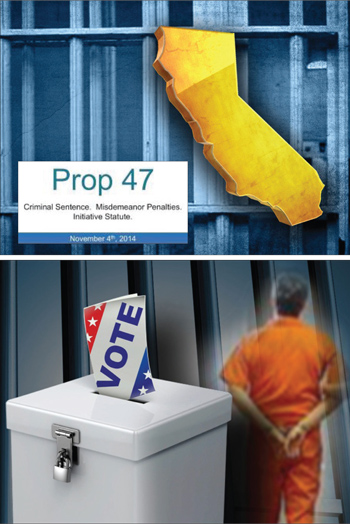By Charlene Muhammad CHARLENEM

LOS ANGELES (FinalCall.com) – Californians will vote this November on a measure that would reclassify some non-serious, nonviolent property and drug crimes from felonies to misdemeanors.
Shoplifting, grand theft, receiving stolen property, forgery and writing bad checks would all be downgraded but the value of the property or checks can’t be more than $950. Inmates who have prior convictions for murder, rape, certain sex offenses or certain gun crimes would not be eligible for re-sentencing.
While the reclassifications, known as Proposition 47 could lead to new sentences for approximately 10,000 inmates, and possible early releases for some, the Reduced Penalties for Some Crimes Initiative is very divisive, prison advocates told The Final Call.
“What they’re doing is turning those ‘wobblers,’ which are these six designated crimes that can easily be charged as a felony or misdemeanor at the discretion of whatever enslaver, but if they washed that stuff out, it probably has racial overtones, class overtones and all of the rest of it meaning the poorer you are, you’re probably going to get that felony as opposed to that misdemeanor,” said Dorsey Nunn of the All of Us or None Prison Advocacy Organization and executive director of the San-Francisco-based Legal Services for Prisoners with Children.
Sometimes when people are wrestling to take the discretion away from prosecutors and police, for Black people to get a determinative or lessor sentence, people should be willing to support that in general, Mr. Nunn said.
Some say Prop. 47 heavily resembles Prop. 36, the 2012 initiative that passed to reform California’s draconian Three Strikes Law, which meant a life sentence for anyone convicted of three felony crimes. But contrary to what voters were told, under the Three Strikes and You’re Out law, many people were being sentenced to life in prison for nonviolent or non-serious crimes like stealing a slice of pizza or shoplifting.
The two are similar because like Prop. 36, Prop. 47 will apply to those with a second offense whose second strike was one of the six low-level felonies identified, according to Geri Silva, coordinator for Fair Chance Project. The group works to free inmates denied parole long after their terms have been satisfied.
Keep in mind, people are just eligible to be re-sentenced so each of these cases will have to go before court, she noted.
People who didn’t qualify for 36 won’t quality for 47 due to convictions of any crime eligible for a life sentence, like 2nd degree murder, attempted murder. But going forward, Ms. Silva gave an example of a person with an attempted murder sentence, and who served their time would be eligible for re-sentencing as a misdemeanor if they’re picked up for a drug possession under the proposed measure.
That person won’t be assigned a 2nd strike, but it could be two or three years in county jail. It could be nothing, or it could be sent to drug courts, she continued.
“It’s confusing and stupid because these are dumb laws and they should have been taken care of by the State Legislature, but they weren’t,” Ms. Silva argued.
Prop. 47 just like Prop. 36 is relatively conservative and won’t have any trouble passing, Ms. Silva predicted. It is not only stupid for people to be serving lengthy sentences for crimes that should be misdemeanors, she told The Final Call but there is an impact the imposed limitations will have on people who’ve paid their debts to society.
“Like Prop. 36, it limits the number of people that can be re-sentenced based on their past, and that means you’re saying that you’re separating out people who committed attempted murder or murder or a burglary, who served their time, and were found eligible to be paroled out into the streets, found eligible to be part of their communities, but they have that scar on them forever, with the “C” for crime or “M” for murderer on their forehead and they can’t be re-sentenced under this,” Ms. Silva argued.
She said the measure doesn’t take prison reform far enough and she doesn’t think it’ll get there as long as people function under a system where money trumps everything.
Critical Resistance, an Oakland-based national prison reform organization that works against prison expansion is not supporting the initiative, said Mohamed Shehk, media and communications director.
“Although we welcome any type of move that would get people out of prisons and jails, we feel that this proposition does that at the expense of creating divisions within the prison population by making a distinction between the so-called low level offenders that deserve freedom and those that are convicted of more serious offenses that for some reason don’t also deserve freedom,” Mr. Shehk stated.
Critical Resistance believes it’s totally possible to advocate for a certain class of prisoners without demonizing others, he said.
Prop. 47 undermines the years of work Critical Resistance and other advocacy groups have dedicated toward trying to eliminate such division which was created by the prison administration and regime in the first place and based on the same kind of racism that the whole prison system is based on in the first place, Mr. Shehk continued.
According to the public safety advocacy group Californians for Safe Neighborhoods and Schools, it supports Prop. 47 because it would stop wasting prison space on low-level nonviolent crimes, apply to juveniles as well as adults, and maintain the current law for registered sex offenders and anyone with prior convictions for rape, murder or child molestation.
In addition, it focuses law enforcement resources on violent and serious crimes, and directs savings to programs that stop the cycle of crime, the proponents noted.
But critics say California is in such a crisis, it should put forth proposals that are strong and really have teeth to address the problem in its prison system. Prop. 47 doesn’t do that, they argue.












